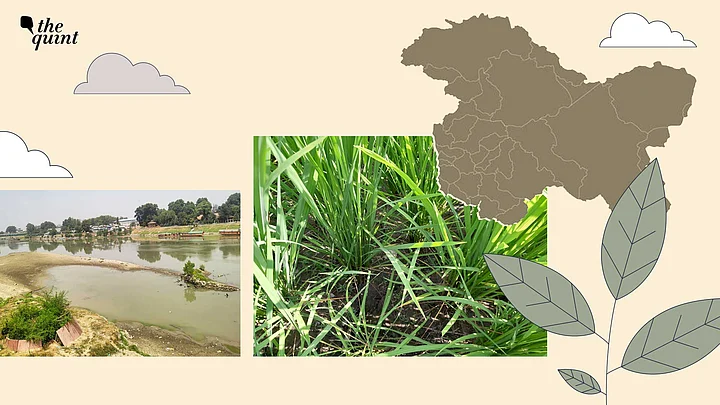Are we prepared for the climate crisis staring us in the face? The Quint wants to go big on telling the most important stories of our time. Support us to tell them. Become a member now.
Ehsan Ahmad, a 35-year-old farmer from Sumbal in North Kashmir’s Bandipora district, is worried about this year's harvest. He owns around 20 kanals of land (approximately one hectare), with five kanals dedicated to apple orchards and the remaining 15 for paddy cultivation.
Under normal conditions, he would earn Rs 3 lakh annually from apples and Rs 60,000 from paddy. However, this year, intense heat and drought have jeopardised his livelihood.
"The dry weather and intense heatwave have withered trees and burned leaves (in Kashmir)," Ehsan laments.
"The apples are undersized and damaged by scabbing. Without irrigation, the orchard trees have dried up. There is an influx of pests, and we can't use pesticides due to lack of precipitation. I doubt we will earn more than Rs 1 lakh from apples this year."Ehsan Ahmad, farmer
Ehsan's paddy fields have also suffered. "The soil has dried up and developed cracks. If the weather continues like this for 10 more days, we might not be able to cultivate rice at all,” he adds.
Ehsan's plight is shared by thousands of farmers in Kashmir who are facing losses due to the drought-like conditions prevailing since June.
‘Record High Temperatures, Dried Up Water Bodies’
Kashmir is experiencing a severe heatwave this year.
On 28 July, Srinagar recorded a high temperature of 36.2 degrees Celsius, the hottest July day in at least 25 years. The previous record was 37 degrees Celsius, set on 9 July 1999.
The minimum temperature on the intervening night of 28-29 July was 24.8 degrees Celsius – the second highest in 132 years.
According to Kashmir-based independent weather forecaster Faizan Arif, monsoon conditions in Jammu and Kashmir have been weak, leading to a significant precipitation deficit over the last several months.
Arif explains, “From 1 June to 28 July, Jammu and Kashmir received only 161.8 mm of rainfall against the normal 243.9 mm, resulting in a 34 percent deficit. This season, western disturbances and monsoon winds have largely avoided Kashmir.”
The lack of rainfall has led to low water levels in streams and rivers, exacerbating the already high temperatures. “The absence of rainfall, combined with sunny weather, is the main reason for these high temperatures,” Arif adds.
Mukhtar Ahmad, Director, Meteorological Department Kashmir, says that the ongoing weather has dried up water bodies and severely impacted the horticulture and agriculture sectors.
“Kashmir has been largely affected by dry weather, while Jammu received intermittent rains over the last one month,” says Ahmad.
Brahan Jyoti Sharma, Chief Engineer, Irrigation and Flood Control Department Kashmir also reported a drastic decline in water levels. Sharma shares, “The water level in River Jhelum is around 50 percent lower than usual," affected houseboat owners, fishes dying, and a shortage of tap water.
But the biggest impact has been on horticulture, a crucial part of Kashmir’s economy with close to 7 lakh families directly or indirectly involved in the sector. It contributes over eight percent to the gross domestic product (GDP) of Jammu and Kashmir.
More than 3,38,000 hectares of land in the valley is used for fruit cultivation, with 1,62,000 hectares dedicated to apple orchards. The main apple harvest is set to begin from 15 August.
In response to the weather conditions, Kashmir's Horticulture Department has issued an advisory urging farmers to irrigate their orchards immediately. “Irrigation should be done in the cooler hours of the day, like morning or evening,” the advisory recommends.
How Lack of Rain & Moisture Is Killing Produce in Kashmir
Zahoor Ahmad Bhat, Director, Horticulture Department, Kashmir, tells The Quint that over 50 percent of orchards in Kashmir depend on rainfall, and now with the dry weather "potentially resulting in undersized fruit and a decline in quality and quantity," there should be emphasis on the importance of the advisory to minimise farmers' losses.
Farooq Ahmad Wani, an apple grower from North Kashmir’s Baramulla, however, shares that the lack of moisture is causing heavy fruit fall and sunburnt produce. “We rely on natural precipitation, and the lack of rain in June and July will significantly impact production,” he says.
It's not just apple farmers who rely on rain though. Akhtar H Malik, a junior scientist at the University of Kashmir's Department of Botany, shares:
“90 percent of crops in hilly areas are rainfed. The dry weather has severely affected production. Water canals have dried up. Our orchards, paddy, maize, pulses, and vegetable cultivation have stagnated. The humid weather has also caused various diseases, desiccating leaves.”
Now, farmers have also been advised to use mulching to conserve soil moisture.
“Mulching with organic or inorganic material, such as grass, crop residues, or plastic mulch, can conserve moisture under the canopy area,” an advisory read.
The horticulture department also suggested that farmers spray anti-transpirants to minimise transpiration loss and use multi-nutrient sprays containing calcium and boron to prevent sunburn and other disorders.
(Mudassir Kuloo is an independent journalist based in Kashmir. He tweets @Mudasirkuloo.)
(At The Quint, we question everything. Play an active role in shaping our journalism by becoming a member today.)
